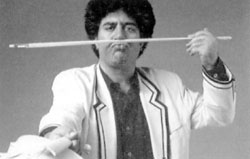A Week of Spanish Cinema took place in the Kyiv House of Cinematography

Meanwhile, the program presented the films of five directors. Works of Almodovar (who won an Oscar this year for best foreign film) and Saura, respectively, opened and closed the festival. On the whole, it was obvious from the films shown that there are many good and different film directors in Spain: however, they have a certain common emotional and even genre denominator. As a rule, this is drama, the heroes of which are common people, contemporary Spanish men and women whose routine life is subjected to serious trials, both external, on the level of society, and internal, within the family circle. Passions in these films are at times far from trivial, and there is no place here for lightheartedness and irony, so common among their neighbors, the Frenchmen. In the whole program only the work of Alex de la Iglesia Day of Beast was classified as comedic fiction. Even the famous joker with his rather clear though somewhat specific humor, Pedro Almodovar, in his late work of 1995 What Did I Do To Deserve This? from an initially light sparkling tone very quickly shifts to melodrama, the laughter being drowned out in the toll of breaking hearts. Tragic anticlimax and complete hopelessness dominate in
The Hunt by Carlos Saura.
Who knows whether the reason lays in the country’s tempestuous history with continuous wars, coups d’etat and dictatorships, but Spanish cinema still continues to remain somehow in thrall to the tragic. Perhaps this is what stops it from winning a wider audience, more worthy of the skill of Spanish directors. But these big-screen dramas also have an indisputable advantage: humanistic pathos, an honest striving to find out the reasons of human misfortune — in a word, qualities that have long ago been forgotten by some nations’ “advanced” filmmaking.






